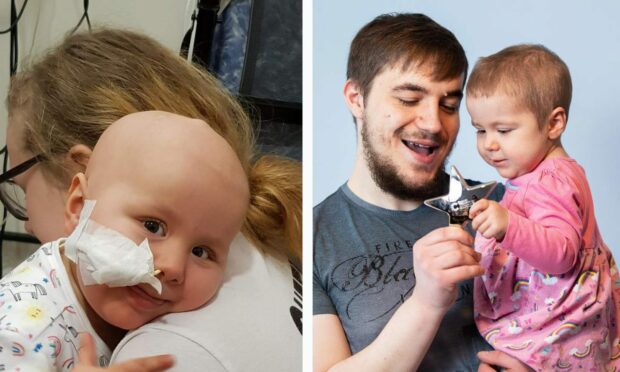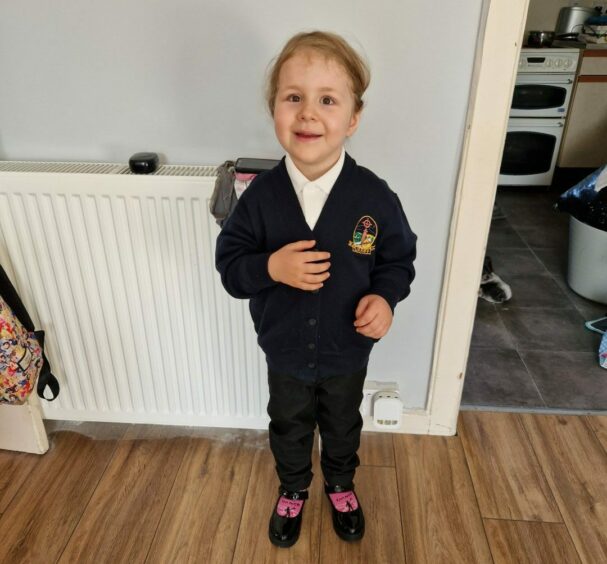A courageous five-year-old from Turriff who successfully battled leukaemia has been chosen as the face of Cancer Research.
Amelia Topa, who is currently in remission after having a stem cell transplant using a newborn baby’s umbilical cord blood, will front a new campaign for the charity.
Cancer Research UK for Children & Young People will feature her picture in charity shop windows.
Just days away from her second birthday, she was pictured with her dad Igor Topa, on a poster to mark Childhood Cancer Awareness Month.
Amelia has come a long way in three years, from being diagnosed with leukaemia at two weeks old, to recently starting primary one at Turriff Primary School.
Amelia’s mum, Kerri Paton, said: “Anyone who meets Amelia would agree that she’s a star. Being told your child has cancer is the worst sentence any parent could ever hear.
“I felt mad at first that someone so tiny should have to go through this horrible disease. But Amelia has been a little fighter from the day she was born.
“I have felt amazed by her strength and lucky to have good support from friends, family and hospital staff.
“We will forever be grateful to a family in America we’ll probably never get a chance to meet.
“The stem cells from America looked just like a small bag of blood but they had the power to make Amelia well again.
“It was a big day for our family when Amelia started school for the first time this August. She’s getting on really well and we couldn’t be prouder.”
Just hours after being born on November 27, 2017, at Dr Gray’s Hospital in Elgin, doctors noticed raised purple spots across Amelia’s body.
On December 14, 2017, Amelia was diagnosed with a mix of two types of cancer, acute lymphoblastic leukaemia and acute myeloid leukaemia.
‘There is a light at the end of the tunnel’
The family were transferred to the Queen Elizabeth University Hospital in Glasgow the following day.
Ms Paton said: “It didn’t hit me properly until I walked out of the room and then I started crying a lot.”
Amelia spent her first Christmas in hospital as the first of four rounds of chemotherapy treatment started.
By spring, the family were advised that Amelia’s best chance of survival was a bone marrow transplant using stem cells, which went ahead on June 28 2018.
By autumn 2018, Amelia was well enough to go home and the family slowly settled back into life in Turriff.
Now Amelia is a big sister to Oscar, Ms Paton dared to hope they could settle into an ordinary family life.
However, Amelia’s grandmother, Angela McNabb who had stood by the family every step of the way suddenly died from heart failure aged 48 just the day before Amelia’s birthday in November 2018.
Ms Paton said: “My mum was my best friend, she was everything to me.
“Mum absolutely loved Amelia and was so close to her. My major source of support was gone and I hadn’t even had the chance to say goodbye. I couldn’t believe it. It was so unfair. That Christmas was heartbreaking.”
Amelia was diagnosed with cancer at just two days old
However, more heartbreak was to come when in February 2019, tests showed that Amelia’s cancer had returned.
Doctors were uncertain at first whether anything else could be done but they suggested a second stem cell transplant, this time using stem cells from umbilical cord blood.
The transplant went ahead in June 2019 exactly a year after the first transplant.
Ms Paton said: “They had to fly the umbilical cord blood over from America. Doctors explained to us that this was the best option to keep the leukaemia away.
“Amelia soared through the transplant and she’s doing really well now. I hope Amelia’s story will help other families going through cancer. There is a light at the end of the tunnel.”
Ms Paton is encouraging people to help save more lives by picking up a gold ribbon badge – the awareness symbol of Childhood Cancer Awareness Month.
Cancer Research UK spokeswoman for Scotland, Lisa Adams, said: “We’re grateful to Amelia’s family for their support.
“Cancer in children and young people is different to cancer in adults – from the types of cancer to the impact of treatment and the long-term side effects survivors often experience. So, it needs different, dedicated research, that we’re grateful to people across Scotland for helping to fund.




Conversation